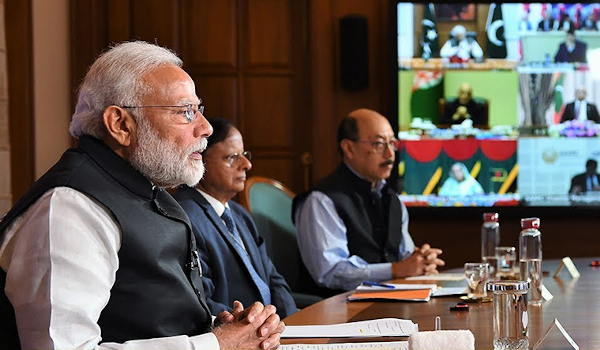External Affairs Minister S Jaishankar on Thursday kicked-off a detailed interaction with Indian envoys abroad to compare notes on the battle against Covid-19, its impact on India and the road ahead. This is Jaishankar’s second round of meetings with top Indian diplomats abroad.
A recurring theme in his last interaction on March 20 was the status of stranded Indians. He had then asked the envoys to urge Indian nationals to stay put and not panic, and look around to secure medical equipment supplies that India would need back home.
The government’s evacuation plan to bring the stranded Indians home over the next few weeks could figure in Thursday’s interaction with the Indian envoys. Jaishankar has started with envoys from the Asia Pacific region; South-East Asian countries will be next and then, South Asia.
Taking virtual diplomacy to the next level. Began the first of a series of regional reviews. A good video conference with our High Commissioners and Ambassadors in Australia, New Zealand, Fiji, Papua & New Guinea and the Pacific Island countries. pic.twitter.com/EqdaWcJfyK — Dr. S. Jaishankar (@DrSJaishankar) April 30, 2020
Jaishankar isn’t the only one talking.
Top external affairs ministry officials are holding a parallel global outreach campaign; interacting with foreign envoys posted in national capital Delhi. The foreign envoys are being told how India is fighting the Sars-CoV-2 pathogen.
Indian diplomats are also taking notes on how other countries have dealt with the virus that has, in just about four months, killed 225,000 people, infected over 3 million and driven countries to go into lockdown mode and threatened to push the global economy into a recession.
Diplomacy couldn’t afford to go in lockdown mode. Instead, it went virtual, shifted gears and went into an overdrive, a foreign ministry official told Hindustan Times.
Prime Minister Narendra Modi had set the template early in the crisis and has been working the phones to scale up India’s diplomatic engagement with the world. That he had also held a video conference with the heads of Indian missions on 30 March was one step in this direction.
In the next 30 days, PM Modi has spoken to leaders of 30 countries. Ditto for Jaishankar who has kept pace with the prime ministers and reached out to his counterparts, even in countries that may have been assumed to be off New Delhi’s radar.
Grenada, a tiny Caribbean island – one of the smallest countries in the western hemisphere – has a population of just over 1 lakh. Comoros, a volcanic archipelago off Africa’s east coast, has a population of 8 lakh.
Many of these calls were to offer support and help.
Jaishankar told the G-20 foreign ministers conference this week that New Delhi is providing pharma assistance to nearly 85 countries on a grant basis, many of them in Africa to support their response to the pandemic.
There have been occasions when the external affairs minister has spoken to counterparts in Russia, Brazil, the United States, Saudi Arabia and Oman in 24 hours. This was on Thursday last.
Jaishankar calls it “virtual diplomacy”.
“Strong friendships thrive even virtually,” he tweeted after wrapping up his video calls to leaders in five countries.
Government sources explain that the stepped-up effort is designed ·to ensure that the diplomatic machinery doesn’t go into stall mode but is kept primed for big action.
India will be moving into a lead role at the World Health Organisation next month when its nominee formally takes over as the director general of the World Health Organisation. Next year, India will also get a spot in the United Nations Security Council as one of the 10 non-permanent members.
The last time India had made it to the UNSC ws in 2012; Hardeep Singh Puri, the ex-diplomat in PM Modi’s council of ministers, was then India’s face at the UN.
Source: HT
Image Courtesy: The Week
You may also like
-
IAF Aircraft Set Course For Exercise Eastern Bridge VII At Oman
-
India-us Working Together In Areas Like Critical Minerals, Supply Chains And Advanced Technologies: Shri Piyush Goyal
-
Defence Secretary to co-chair 5th India-Philippines Joint Defence Cooperation Committee meeting in Manila
-
2nd India-Japan Finance Dialogue held in Tokyo on 6th September, 2024
-
Prime Minister, Shri Narendra Modi welcomes Crown Prince of Abu Dhabi
